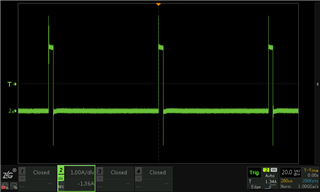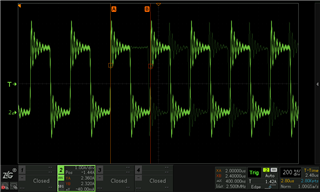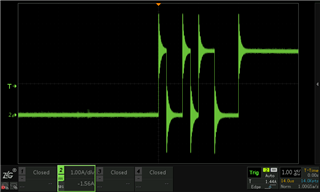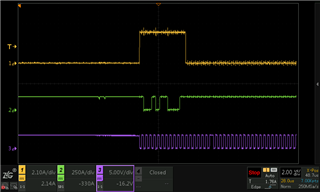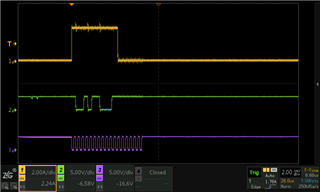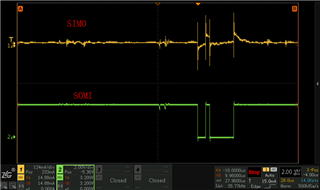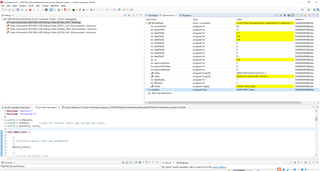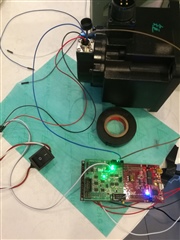Hello,expert:
I am honored to have this opportunity to ask you a question. My experimental equipment mainly includes TI's F28379D launchpad + Boostl-POSMGR (encoder interface board).And the program I use is derived from TI , and its path is:D:\ti\c2000\C2000Ware_MotorControl_SDK_3_01_00_00\solutions\boostxl_posmgr\f2837xd. Because I thought the actual Tformat encoder CF ID I was using was different from the TI's sample, I changed this, but found the program stays at ESTOP0 inside the tformat_exCommands(void) function.As shown in the figure below, Figure 1 is DF of TI routine encoder(The encoder type isTS5700N8501 ).Figure. 2 shows the DF of the encoder I used.(The encoder type is TS5720N8401).Figure. 3shows My program is here to stay.

Figure 1 TI sample(TS5700N8501 )
The following is TI source code:
uint16_t PM_tformat_setupCommand(uint16_t tformatDataID, uint16_t eepromAddr,
uint16_t eepromData, uint16_t crcSend)
{
uint16_t sendClks;
uint16_t receiveClks;
uint16_t dummySPIClks;
uint16_t i;
uint16_t word1, word2, word3, temp;
uint16_t addrl, datal;
tformat_resetCLB();
tformatData.dataReady = 0;
word1 = (tformatDataID << 6) | 0x903F;
switch(tformatDataID)
{
case (PM_TFORMAT_DATAID0):
case (PM_TFORMAT_DATAID1):
case (PM_TFORMAT_DATAID7):
case (PM_TFORMAT_DATAID8):
case (PM_TFORMAT_DATAIDC):
sendClks = ABIT + PACKET_BITS + IDLE_BITS;
receiveClks = 6 * PACKET_BITS ;
if(((sendClks + receiveClks) % 16) == 0)
{
tformatData.fifoLevel = ((sendClks + receiveClks) / 16);
}
else
{
tformatData.fifoLevel = ((sendClks + receiveClks) / 16) + 1;
}
dummySPIClks = (tformatData.fifoLevel * 16) -
(sendClks + receiveClks);
tformat_configureSPILen(15);
//
//void tformat_configureCLBLen(uint16_t CLB4_C1_M1,
// uint16_t CLB4_C1_M2, uint16_t CLB4_R0)
//
tformat_configureCLBLen((PACKET_BITS + 2), sendClks,
receiveClks + dummySPIClks);
tformatData.sdata[0] = word1;
tformatData.sdata[1] = 0xFFFF;
tformatData.sdata[2] = 0xFFFF;
tformatData.sdata[3] = 0xFFFF;
for (i = 0;i < tformatData.fifoLevel;i++)
{
SPI_writeDataNonBlocking(PM_TFORMAT_SPI, tformatData.sdata[i]);
}
break;
case (PM_TFORMAT_DATAID2):
sendClks = ABIT + PACKET_BITS + IDLE_BITS;
receiveClks = 4 * PACKET_BITS ;
if(((sendClks + receiveClks) % 16) == 0)
{
tformatData.fifoLevel = ((sendClks + receiveClks) / 16);
}
else
{
tformatData.fifoLevel = ((sendClks + receiveClks) / 16) + 1;
}
dummySPIClks = (tformatData.fifoLevel * 16) -
(sendClks + receiveClks);
tformat_configureSPILen(15);
tformat_configureCLBLen((PACKET_BITS + 2), sendClks,
receiveClks + dummySPIClks);
tformatData.sdata[0] = word1;
tformatData.sdata[1] = 0xFFFF;
tformatData.sdata[2] = 0xFFFF;
tformatData.sdata[3] = 0xFFFF;
for (i = 0;i < tformatData.fifoLevel;i++)
{
SPI_writeDataNonBlocking(PM_TFORMAT_SPI, tformatData.sdata[i]);
}
break;
case (PM_TFORMAT_DATAID3):
sendClks = ABIT + PACKET_BITS + IDLE_BITS;
receiveClks = 11 * PACKET_BITS ;
if(((sendClks + receiveClks) % 16) == 0)
{
tformatData.fifoLevel = ((sendClks + receiveClks) / 16);
}
else
{
tformatData.fifoLevel = ((sendClks + receiveClks) / 16) + 1;
}
dummySPIClks = (tformatData.fifoLevel * 16) -
(sendClks + receiveClks);
tformat_configureSPILen(15);
//
//void tformat_configureCLBLen(uint16_t CLB4_C1_M1,
//uint16_t CLB4_C1_M2, uint16_t CLB4_R0)
//
tformat_configureCLBLen((PACKET_BITS + 2), sendClks,
receiveClks + dummySPIClks);
tformatData.sdata[0] = word1;
tformatData.sdata[1] = 0xFFFF;
tformatData.sdata[2] = 0xFFFF;
tformatData.sdata[3] = 0xFFFF;
for (i = 0;i < tformatData.fifoLevel;i++)
{
SPI_writeDataNonBlocking(PM_TFORMAT_SPI,
tformatData.sdata[i]);
}
break;
case (PM_TFORMAT_DATAIDD):
sendClks = ABIT + 3 * PACKET_BITS + IDLE_BITS;
receiveClks = 4 * PACKET_BITS ;
addrl = (__flip32(eepromAddr) >> 24) & 0xFE; // busy "0"
temp = (addrl >> 4) & 0xF;
word1 = (tformatDataID << 6) | 0x9020 | temp;
temp = (addrl & 0xF) << 12;
word2 = temp | 0x803 | (crcSend << 2);
if(((sendClks + receiveClks) % 16) == 0)
{
tformatData.fifoLevel = ((sendClks + receiveClks) / 16);
}
else
{
tformatData.fifoLevel = ((sendClks + receiveClks) / 16) + 1;
}
dummySPIClks = (tformatData.fifoLevel * 16) -
(sendClks + receiveClks);
tformat_configureSPILen(15);
//
//void tformat_configureCLBLen(uint16_t CLB4_C1_M1,
//uint16_t CLB4_C1_M2, uint16_t CLB4_R0)
//
tformat_configureCLBLen((3 * PACKET_BITS + 2), sendClks,
receiveClks + dummySPIClks);
tformatData.sdata[0] = word1;
tformatData.sdata[1] = word2;
tformatData.sdata[2] = 0xFFFF;
tformatData.sdata[3] = 0xFFFF;
for (i = 0;i < tformatData.fifoLevel;i++)
{
SPI_writeDataNonBlocking(PM_TFORMAT_SPI, tformatData.sdata[i]);
}
break;
case (PM_TFORMAT_DATAID6):
sendClks = ABIT + 4 * PACKET_BITS + IDLE_BITS;
receiveClks = 4 * PACKET_BITS ;
addrl = (__flip32(eepromAddr) >> 24) & 0xFE; // busy "0"
datal = (__flip32(eepromData) >> 24) & 0xFF;
temp = (addrl >> 4) & 0xF;
word1 = (tformatDataID << 6) | 0x9020 | temp;
temp = (addrl & 0xF) << 12;
word2 = temp | 0x802 | (datal << 2);
word3 = (crcSend << 8) | 0xFF;
if(((sendClks + receiveClks) % 16) == 0)
{
tformatData.fifoLevel = ((sendClks + receiveClks) / 16);
}
else
{
tformatData.fifoLevel = ((sendClks + receiveClks) / 16) + 1;
}
dummySPIClks = (tformatData.fifoLevel * 16) -
(sendClks + receiveClks);
tformat_configureSPILen(15);
tformat_configureCLBLen((4 * PACKET_BITS + 2), sendClks,
receiveClks + dummySPIClks);
tformatData.sdata[0] = word1;
tformatData.sdata[1] = word2;
tformatData.sdata[2] = word3;
tformatData.sdata[3] = 0xFFFF;
for (i = 0;i < tformatData.fifoLevel;i++)
{
SPI_writeDataNonBlocking(PM_TFORMAT_SPI, tformatData.sdata[i]);
}
break;
default:
word1 = 0;
break;
}
return(word1);
}
uint16_t PM_tformat_receiveData(uint16_t tformatDataID)
{
uint32_t len, bitIndex, wordNo;
uint16_t word1;
word1 = 1;
switch(tformatDataID)
{
case (PM_TFORMAT_DATAID0):
case (PM_TFORMAT_DATAID1):
case (PM_TFORMAT_DATAID7):
case (PM_TFORMAT_DATAID8):
case (PM_TFORMAT_DATAIDC):
len = 8;
bitIndex = 13;
wordNo = 1;
tformatData.controlField = tformat_getBits (len, wordNo, bitIndex);
wordNo = wordNo + (10 + (16 - bitIndex) ) / 16;
bitIndex = 16 - ((10 + (16 - bitIndex)) % 16) ;
tformatData.statusField = tformat_getBits (len, wordNo, bitIndex);
wordNo = wordNo + (10 + (16 - bitIndex) ) / 16;
bitIndex = 16 - ((10 + (16 - bitIndex)) % 16) ;
tformatData.dataField0 = tformat_getBits (len, wordNo, bitIndex);
wordNo = wordNo + (10 + (16 - bitIndex) ) / 16;
bitIndex = 16 - ((10 + (16 - bitIndex)) % 16) ;
tformatData.dataField1 = tformat_getBits (len, wordNo, bitIndex);
wordNo = wordNo + (10 + (16 - bitIndex) ) / 16;
bitIndex = 16 - ((10 + (16 - bitIndex)) % 16) ;
tformatData.dataField2 = tformat_getBits (len, wordNo, bitIndex);
wordNo = wordNo + (10 + (16 - bitIndex) ) / 16;
bitIndex = 16 - ((10 + (16 - bitIndex)) % 16) ;
tformatData.crc = tformat_getBits (len, wordNo, bitIndex);
tformatData.rxPkts[0] = ((uint32_t) tformatData.controlField << 24)
| ((uint32_t) tformatData.statusField << 16)
| ((uint32_t) tformatData.dataField0 << 8)
| ((uint32_t) tformatData.dataField1);
tformatData.rxPkts[1] = ((uint32_t) tformatData.dataField2) ;
break;
case (PM_TFORMAT_DATAID2):
len = 8;
bitIndex = 13;
wordNo = 1;
tformatData.controlField = tformat_getBits (len, wordNo, bitIndex);
wordNo = wordNo + (10 + (16 - bitIndex) ) / 16;
bitIndex = 16 - ((10 + (16 - bitIndex)) % 16) ;
tformatData.statusField = tformat_getBits (len, wordNo, bitIndex);
wordNo = wordNo + (10 + (16 - bitIndex) ) / 16;
bitIndex = 16 - ((10 + (16 - bitIndex)) % 16) ;
tformatData.dataField0 = tformat_getBits (len, wordNo, bitIndex);
wordNo = wordNo + (10 + (16 - bitIndex) ) / 16;
bitIndex = 16 - ((10 + (16 - bitIndex)) % 16) ;
tformatData.crc = tformat_getBits (len, wordNo, bitIndex);
tformatData.rxPkts[0] = ((uint32_t) tformatData.controlField << 16)
| ((uint32_t) tformatData.statusField << 8)
| ((uint32_t) tformatData.dataField0);
break;
case (PM_TFORMAT_DATAID3):
len = 8;
bitIndex = 13;
wordNo = 1;
tformatData.controlField = tformat_getBits (len, wordNo, bitIndex);
wordNo = wordNo + (10 + (16 - bitIndex) ) / 16;
bitIndex = 16 - ((10 + (16 - bitIndex)) % 16) ;
tformatData.statusField = tformat_getBits (len, wordNo, bitIndex);
wordNo = wordNo + (10 + (16 - bitIndex) ) / 16;
bitIndex = 16 - ((10 + (16 - bitIndex)) % 16) ;
tformatData.dataField0 = tformat_getBits (len, wordNo, bitIndex);
wordNo = wordNo + (10 + (16 - bitIndex) ) / 16;
bitIndex = 16 - ((10 + (16 - bitIndex)) % 16) ;
tformatData.dataField1 = tformat_getBits (len, wordNo, bitIndex);
wordNo = wordNo + (10 + (16 - bitIndex) ) / 16;
bitIndex = 16 - ((10 + (16 - bitIndex)) % 16) ;
tformatData.dataField2 = tformat_getBits (len, wordNo, bitIndex);
wordNo = wordNo + (10 + (16 - bitIndex) ) / 16;
bitIndex = 16 - ((10 + (16 - bitIndex)) % 16) ;
tformatData.dataField3 = tformat_getBits (len, wordNo, bitIndex);
wordNo = wordNo + (10 + (16 - bitIndex) ) / 16;
bitIndex = 16 - ((10 + (16 - bitIndex)) % 16) ;
tformatData.dataField4 = tformat_getBits (len, wordNo, bitIndex);
wordNo = wordNo + (10 + (16 - bitIndex) ) / 16;
bitIndex = 16 - ((10 + (16 - bitIndex)) % 16) ;
tformatData.dataField5 = tformat_getBits (len, wordNo, bitIndex);
wordNo = wordNo + (10 + (16 - bitIndex) ) / 16;
bitIndex = 16 - ((10 + (16 - bitIndex)) % 16) ;
tformatData.dataField6 = tformat_getBits (len, wordNo, bitIndex);
wordNo = wordNo + (10 + (16 - bitIndex) ) / 16;
bitIndex = 16 - ((10 + (16 - bitIndex)) % 16) ;
tformatData.dataField7 = tformat_getBits (len, wordNo, bitIndex);
wordNo = wordNo + (10 + (16 - bitIndex) ) / 16;
bitIndex = 16 - ((10 + (16 - bitIndex)) % 16) ;
tformatData.crc = tformat_getBits (len, wordNo, bitIndex);
tformatData.rxPkts[0] = ((uint32_t) tformatData.controlField << 24)
| ((uint32_t) tformatData.statusField << 16)
| ((uint32_t) tformatData.dataField0 << 8)
| (uint32_t) tformatData.dataField1;
tformatData.rxPkts[1] = ((uint32_t) tformatData.dataField2 << 24) |
((uint32_t) tformatData.dataField3 << 16) |
((uint32_t) tformatData.dataField4 << 8) |
((uint32_t) tformatData.dataField5);
tformatData.rxPkts[2] = ((uint32_t) tformatData.dataField6 << 8) |
((uint32_t) tformatData.dataField7);
break;
case (PM_TFORMAT_DATAIDD):
len = 8;
bitIndex = 9;
wordNo = 2;
tformatData.controlField = tformat_getBits (len, wordNo, bitIndex);
wordNo = wordNo + (10 + (16 - bitIndex) ) / 16;
bitIndex = 16 - ((10 + (16 - bitIndex)) % 16) ;
tformatData.eepromAddress = tformat_getBits (len,
wordNo, bitIndex);
wordNo = wordNo + (10 + (16 - bitIndex) ) / 16;
bitIndex = 16 - ((10 + (16 - bitIndex)) % 16) ;
tformatData.eepromRdDtata = tformat_getBits (len,
wordNo, bitIndex);
wordNo = wordNo + (10 + (16 - bitIndex) ) / 16;
bitIndex = 16 - ((10 + (16 - bitIndex)) % 16) ;
tformatData.crc = tformat_getBits (len, wordNo, bitIndex);
tformatData.rxPkts[0] = ((uint32_t) tformatData.controlField << 16)
| ((uint32_t) tformatData.eepromAddress << 8)
| ((uint32_t) tformatData.eepromRdDtata);
break;
case (PM_TFORMAT_DATAID6):
len = 8;
bitIndex = 15;
wordNo = 3;
tformatData.controlField = tformat_getBits (len, wordNo, bitIndex);
wordNo = wordNo + (10 + (16 - bitIndex) ) / 16;
bitIndex = 16 - ((10 + (16 - bitIndex)) % 16) ;
tformatData.eepromAddress = tformat_getBits (len, wordNo, bitIndex);
wordNo = wordNo + (10 + (16 - bitIndex) ) / 16;
bitIndex = 16 - ((10 + (16 - bitIndex)) % 16) ;
tformatData.eepromRdDtata = tformat_getBits (len, wordNo, bitIndex);
wordNo = wordNo + (10 + (16 - bitIndex) ) / 16;
bitIndex = 16 - ((10 + (16 - bitIndex)) % 16) ;
tformatData.crc = tformat_getBits (len, wordNo, bitIndex);
tformatData.rxPkts[0] = ((uint32_t) tformatData.controlField << 16)
| ((uint32_t) tformatData.eepromAddress << 8)
| ((uint32_t) tformatData.eepromRdDtata);
break;
}
return(word1);
}
uint16_t tformat_exCommands(void)
{
uint16_t retval1; //used for function return val storage and checks
uint32_t address, address_tmp, data, data_tmp;
uint32_t crcResult;
retval1 = PM_tformat_setupCommand (PM_TFORMAT_DATAID2, 0, 0, 0);
PM_tformat_startOperation();
while(tformatData.dataReady != 1) ;//{;}
retval1 = PM_tformat_receiveData(PM_TFORMAT_DATAID2);
crcResult = PM_tformat_getCRC(0, 24, 8, (uint16_t *)&tformatData.rxPkts,
tformatCRCtable, 3);
crcResult = crcResult ^ (0xFF);
if(!tformat_checkCRC(crcResult, tformatData.crc))
{
ESTOP0;
}
SysCtl_delay(40000L); //DELAY_US(400L);
retval1 = PM_tformat_setupCommand (PM_TFORMAT_DATAID0, 0, 0, 0);
PM_tformat_startOperation();
while(tformatData.dataReady != 1) {}
retval1 = PM_tformat_receiveData(PM_TFORMAT_DATAID0);
crcResult = PM_tformat_getCRC(0, 40, 8, (uint16_t *)&tformatData.rxPkts,
tformatCRCtable, 5);
crcResult = crcResult ^ (0xFF);
if(!tformat_checkCRC(crcResult, tformatData.crc))
{
ESTOP0;
}
SysCtl_delay(40000L); //DELAY_US(400L);
retval1 = PM_tformat_setupCommand (PM_TFORMAT_DATAID1, 0, 0, 0);
PM_tformat_startOperation();
while(tformatData.dataReady != 1) {}
retval1 = PM_tformat_receiveData(PM_TFORMAT_DATAID1);
crcResult = PM_tformat_getCRC(0, 40, 8, (uint16_t *)&tformatData.rxPkts,
tformatCRCtable, 5);
crcResult = crcResult ^ (0xFF);
if(!tformat_checkCRC(crcResult, tformatData.crc))
{
ESTOP0;
}
SysCtl_delay(40000L); //DELAY_US(400L);
address = 1;
address_tmp = (__flip32(address) >> 24) & 0xFE; // includes busy "0"
tformatData.rxPkts[0] = ((((uint32_t) PM_TFORMAT_DATAIDD) | 0x40) << 8) |
(uint32_t) address_tmp;
crcResult = PM_tformat_getCRC(0, 16, 8, (uint16_t *)&tformatData.rxPkts,
tformatCRCtable, 2);
crcResult = (crcResult) ^ (0xFF);
retval1 = PM_tformat_setupCommand (PM_TFORMAT_DATAIDD, address, 0, crcResult);
PM_tformat_startOperation();
while(tformatData.dataReady != 1) {}
retval1 = PM_tformat_receiveData(PM_TFORMAT_DATAIDD);
crcResult = PM_tformat_getCRC(0, 32, 8, (uint16_t *)&tformatData.rxPkts,
tformatCRCtable, 4);
crcResult = crcResult ^ (0xFF);
if(!tformat_checkCRC(crcResult, tformatData.crc))
{
ESTOP0;
}
SysCtl_delay(40000L); //DELAY_US(400L);
address = 1; data = 35;
address_tmp = (__flip32(address) >> 24) & 0xFE; // includes busy "0"
data_tmp = (__flip32(data) >> 24) & 0xFF;
tformatData.rxPkts[0] = ((((uint32_t) PM_TFORMAT_DATAID6) | 0x40) << 16) |
(((uint32_t) address_tmp) << 8) |
((uint32_t) data_tmp);
crcResult = PM_tformat_getCRC(0, 24, 8, (uint16_t *)&tformatData.rxPkts,
tformatCRCtable, 3);
crcResult = (crcResult) ^ (0xFF);
retval1 = PM_tformat_setupCommand (PM_TFORMAT_DATAID6, address, data, crcResult);
PM_tformat_startOperation();
while(tformatData.dataReady != 1) {}
retval1 = PM_tformat_receiveData(PM_TFORMAT_DATAID6);
crcResult = PM_tformat_getCRC(0, 32, 8, (uint16_t *)&tformatData.rxPkts,
tformatCRCtable, 4);
crcResult = crcResult ^ (0xFF);
if(!tformat_checkCRC(crcResult, tformatData.crc))
{
ESTOP0;
}
SysCtl_delay(40000L); //DELAY_US(400L);
address = 1;
address_tmp = (__flip32(address) >> 24) & 0xFE; // includes busy "0"
tformatData.rxPkts[0] = ((((uint32_t) PM_TFORMAT_DATAIDD) | 0x40) << 8) |
(uint32_t) address_tmp;
crcResult = PM_tformat_getCRC(0, 16, 8, (uint16_t *)&tformatData.rxPkts,
tformatCRCtable, 2);
crcResult = (crcResult) ^ (0xFF);
retval1 = PM_tformat_setupCommand (PM_TFORMAT_DATAIDD, address, 0, crcResult);
PM_tformat_startOperation();
while(tformatData.dataReady != 1) {}
retval1 = PM_tformat_receiveData(PM_TFORMAT_DATAIDD);
crcResult = PM_tformat_getCRC(0, 32, 8, (uint16_t *)&tformatData.rxPkts,
tformatCRCtable, 4);
crcResult = crcResult ^ (0xFF);
if(!tformat_checkCRC(crcResult, tformatData.crc))
{
ESTOP0;
}
SysCtl_delay(4000L);
return(retval1);
}
while(1)
{
retVal1 = PM_tformat_setupCommand (PM_TFORMAT_DATAID3, 0, 0, 0);
PM_tformat_startOperation();
while(tformatData.dataReady != 1);// {}
retVal1 = PM_tformat_receiveData(PM_TFORMAT_DATAID3);
// uint16_t PM_tformat_getCRC(uint16_t inputCRCaccum, uint16_t nBitsData,uint16_t nBitsPoly, uint16_t * msg, uint16_t *crcTable, uint16_t rxLen)
crcResult = PM_tformat_getCRC(0, 80, 8, (uint16_t *)&tformatData.rxPkts,tformatCRCtable, 10);
crcResult = crcResult ^ (0xFF);
if(!tformat_checkCRC(crcResult, tformatData.crc))
{
ESTOP0;
}

Figure. 2 My encoder(TS5720N8401)
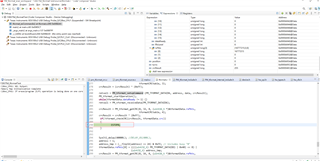
Figure. 3.My program is here to stay.
The program I modified mainly consists of four functions.
uint16_t PM_tformat_setupCommand(uint16_t tformatDataID, uint16_t eepromAddr, uint16_t eepromData, uint16_t crcSend): 1. Change the value of receiveClks
2. Change dataReady value 0 to 1
uint16_t PM_tformat_receiveData(uint16_t tformatDataID):
1.Add the code:tformatData.dataReady = 0;
2.Modified the tformatData rxPkts
uint16_t tformat_exCommands(void) and main function loops while:Modified the crcResult
The details are shown as follows(The yellow part is the modification):
uint16_t PM_tformat_setupCommand(uint16_t tformatDataID, uint16_t eepromAddr,
uint16_t eepromData, uint16_t crcSend)
{
uint16_t sendClks;
uint16_t receiveClks;
uint16_t dummySPIClks;
uint16_t i;
uint16_t word1, word2, word3, temp;
uint16_t addrl, datal;
tformat_resetCLB();
tformatData.dataReady = 1;
word1 = (tformatDataID << 6) | 0x903F;
switch(tformatDataID)
{
case (PM_TFORMAT_DATAID2):
sendClks = ABIT + PACKET_BITS + IDLE_BITS;
receiveClks = 4*PACKET_BITS ;
if(((sendClks + receiveClks) % 16) == 0)
{
tformatData.fifoLevel = ((sendClks + receiveClks) / 16);
}
else
{
tformatData.fifoLevel = ((sendClks + receiveClks) / 16) + 1;
}
dummySPIClks = (tformatData.fifoLevel * 16) -(sendClks + receiveClks);
tformat_configureSPILen(15);//
//
//void tformat_configureCLBLen(uint16_t CLB4_C1_M1,
// uint16_t CLB4_C1_M2, uint16_t CLB4_R0)
//
tformat_configureCLBLen((PACKET_BITS + 2), sendClks,receiveClks + dummySPIClks);//PACKET_BITS + 2改为PACKET_BITS + 10**********************************************
tformatData.sdata[0] = word1;
tformatData.sdata[1] = 0xFFFF;
tformatData.sdata[2] = 0xFFFF;
tformatData.sdata[3] = 0xFFFF;
for (i = 0;i < tformatData.fifoLevel;i++)
{
SPI_writeDataNonBlocking(PM_TFORMAT_SPI, tformatData.sdata[i]);
}
break;
case (PM_TFORMAT_DATAID3):
sendClks = ABIT + PACKET_BITS + IDLE_BITS;
receiveClks = 11* PACKET_BITS ;
if(((sendClks + receiveClks) % 16) == 0)
{
tformatData.fifoLevel = ((sendClks + receiveClks) / 16);
}
else
{
tformatData.fifoLevel = ((sendClks + receiveClks) / 16) + 1;
}
dummySPIClks = (tformatData.fifoLevel * 16) -(sendClks + receiveClks);
tformat_configureSPILen(15);
//
//void tformat_configureCLBLen(uint16_t CLB4_C1_M1,
// uint16_t CLB4_C1_M2, uint16_t CLB4_R0)
//
tformat_configureCLBLen((PACKET_BITS + 2), sendClks,receiveClks + dummySPIClks);//*******************************************
tformatData.sdata[0] = word1;
tformatData.sdata[1] = 0xFFFF;
tformatData.sdata[2] = 0xFFFF;
tformatData.sdata[3] = 0xFFFF;
for (i = 0;i < tformatData.fifoLevel;i++)
{
SPI_writeDataNonBlocking(PM_TFORMAT_SPI, tformatData.sdata[i]);
}
break;
case (PM_TFORMAT_DATAID4):
sendClks = ABIT + PACKET_BITS + IDLE_BITS;
receiveClks = 7* PACKET_BITS ;
if(((sendClks + receiveClks) % 16) == 0)
{
tformatData.fifoLevel = ((sendClks + receiveClks) / 16);
}
else
{
tformatData.fifoLevel = ((sendClks + receiveClks) / 16) + 1;
}
dummySPIClks = (tformatData.fifoLevel * 16) -(sendClks + receiveClks);
tformat_configureSPILen(15);
//
//void tformat_configureCLBLen(uint16_t CLB4_C1_M1,
// uint16_t CLB4_C1_M2, uint16_t CLB4_R0)
//
tformat_configureCLBLen((PACKET_BITS + 2), sendClks,receiveClks + dummySPIClks);//******************************************************
tformatData.sdata[0] = word1;
tformatData.sdata[1] = 0xFFFF;
tformatData.sdata[2] = 0xFFFF;
tformatData.sdata[3] = 0xFFFF;
for (i = 0;i < tformatData.fifoLevel;i++)
{
SPI_writeDataNonBlocking(PM_TFORMAT_SPI, tformatData.sdata[i]);
}
break;
case (PM_TFORMAT_DATAID5):
sendClks = ABIT + PACKET_BITS + IDLE_BITS;
receiveClks =9* PACKET_BITS ;
if(((sendClks + receiveClks) % 16) == 0)
{
tformatData.fifoLevel = ((sendClks + receiveClks) / 16);
}
else
{
tformatData.fifoLevel = ((sendClks + receiveClks) / 16) + 1;
}
dummySPIClks = (tformatData.fifoLevel * 16) -(sendClks + receiveClks);
tformat_configureSPILen(15);
//
//void tformat_configureCLBLen(uint16_t CLB4_C1_M1,
// uint16_t CLB4_C1_M2, uint16_t CLB4_R0)
//
tformat_configureCLBLen((PACKET_BITS + 2), sendClks,receiveClks + dummySPIClks);//*************************
tformatData.sdata[0] = word1;
tformatData.sdata[1] = 0xFFFF;
tformatData.sdata[2] = 0xFFFF;
tformatData.sdata[3] = 0xFFFF;
for (i = 0;i < tformatData.fifoLevel;i++)
{
SPI_writeDataNonBlocking(PM_TFORMAT_SPI, tformatData.sdata[i]);
}
break;
case (PM_TFORMAT_DATAID7):
case (PM_TFORMAT_DATAID8):
case (PM_TFORMAT_DATAIDC):
sendClks = ABIT + PACKET_BITS + IDLE_BITS;
receiveClks = 6 * PACKET_BITS ;
if(((sendClks + receiveClks) % 16) == 0)
{
tformatData.fifoLevel = ((sendClks + receiveClks) / 16);
}
else
{
tformatData.fifoLevel = ((sendClks + receiveClks) / 16) + 1;
}
dummySPIClks = (tformatData.fifoLevel * 16) -(sendClks + receiveClks);
tformat_configureSPILen(15);
//
//void tformat_configureCLBLen(uint16_t CLB4_C1_M1,
// uint16_t CLB4_C1_M2, uint16_t CLB4_R0)
//
tformat_configureCLBLen((PACKET_BITS + 2), sendClks,receiveClks + dummySPIClks);//********************************
tformatData.sdata[0] = word1;
tformatData.sdata[1] = 0xFFFF;
tformatData.sdata[2] = 0xFFFF;
tformatData.sdata[3] = 0xFFFF;
for (i = 0;i < tformatData.fifoLevel;i++)
{
SPI_writeDataNonBlocking(PM_TFORMAT_SPI, tformatData.sdata[i]);
}
break;
case (PM_TFORMAT_DATAIDD):
sendClks = ABIT + 3 * PACKET_BITS + IDLE_BITS;
receiveClks = 4 * PACKET_BITS ;
addrl = (__flip32(eepromAddr) >> 24) & 0xFE; // busy "0"
temp = (addrl >> 4) & 0xF;
word1 = (tformatDataID << 6) | 0x9020 | temp;
temp = (addrl & 0xF) << 12;
word2 = temp | 0x803 | (crcSend << 2);
if(((sendClks + receiveClks) % 16) == 0)
{
tformatData.fifoLevel = ((sendClks + receiveClks) / 16);
}
else
{
tformatData.fifoLevel = ((sendClks + receiveClks) / 16) + 1;
}
dummySPIClks = (tformatData.fifoLevel * 16) -(sendClks + receiveClks);
tformat_configureSPILen(15);
//
//void tformat_configureCLBLen(uint16_t CLB4_C1_M1,
//uint16_t CLB4_C1_M2, uint16_t CLB4_R0)
//
tformat_configureCLBLen((3 * PACKET_BITS + 2), sendClks,receiveClks + dummySPIClks);//*****************************************
tformatData.sdata[0] = word1;
tformatData.sdata[1] = word2;
tformatData.sdata[2] = 0xFFFF;
tformatData.sdata[3] = 0xFFFF;
for (i = 0;i < tformatData.fifoLevel;i++)
{
SPI_writeDataNonBlocking(PM_TFORMAT_SPI, tformatData.sdata[i]);
}
break;
case (PM_TFORMAT_DATAID6):
sendClks = ABIT + 4 * PACKET_BITS + IDLE_BITS;
receiveClks = 4 * PACKET_BITS ;
addrl = (__flip32(eepromAddr) >> 24) & 0xFE; // busy "0" 0xFE=0000 0000 1111 1110 addrl=XXXX XXX0
datal = (__flip32(eepromData) >> 24) & 0xFF;//0xFF=0000 0000 1111 1111 data1=XXXX XXXX
temp = (addrl >> 4) & 0xF;//temp=0000 XXXX
word1 = (tformatDataID << 6) | 0x9020 | temp;// 0x9020=1001 0000 0010 0000 word1=(0000 0000 0000 1100<<6) | 1001 0000 0010 0000 | 0000 XXXX
temp = (addrl & 0xF) << 12;
word2 = temp | 0x802 | (datal << 2);
word3 = (crcSend << 8) | 0xFF;
if(((sendClks + receiveClks) % 16) == 0)
{
tformatData.fifoLevel = ((sendClks + receiveClks) / 16);
}
else
{
tformatData.fifoLevel = ((sendClks + receiveClks) / 16) + 1;
}
dummySPIClks = (tformatData.fifoLevel * 16) -(sendClks + receiveClks);
tformat_configureSPILen(15);
tformat_configureCLBLen((4 * PACKET_BITS + 2), sendClks,receiveClks + dummySPIClks);//**************************************
tformatData.sdata[0] = word1;
tformatData.sdata[1] = word2;
tformatData.sdata[2] = word3;
tformatData.sdata[3] = 0xFFFF;
for (i = 0;i < tformatData.fifoLevel;i++)
{
SPI_writeDataNonBlocking(PM_TFORMAT_SPI, tformatData.sdata[i]);
}
break;
default:
word1 = 0;
break;
}
return(word1);
}
uint16_t PM_tformat_receiveData(uint16_t tformatDataID)
{
uint32_t len, bitIndex, wordNo;
uint16_t word1;
word1 = 1;
tformatData.dataReady = 0;
switch(tformatDataID)
{
case (PM_TFORMAT_DATAID2):
len = 8;
bitIndex = 13;
wordNo = 1;
tformatData.controlField = tformat_getBits (len, wordNo, bitIndex);
wordNo = wordNo + (10 + (16 - bitIndex) ) / 16;
bitIndex = 16 - ((10 + (16 - bitIndex)) % 16) ;
tformatData.statusField = tformat_getBits (len, wordNo, bitIndex);
wordNo = wordNo + (10 + (16 - bitIndex) ) / 16;
bitIndex = 16 - ((10 + (16 - bitIndex)) % 16) ;
tformatData.dataField0 = tformat_getBits (len, wordNo, bitIndex);
wordNo = wordNo + (10 + (16 - bitIndex) ) / 16;
bitIndex = 16 - ((10 + (16 - bitIndex)) % 16) ;
tformatData.crc = tformat_getBits (len, wordNo, bitIndex);
tformatData.rxPkts[0] = ((uint32_t) tformatData.controlField << 16)
| ((uint32_t) tformatData.statusField << 8)
| ((uint32_t) tformatData.dataField0);
break;
case (PM_TFORMAT_DATAID3):
len = 8;
bitIndex = 13;
wordNo = 1;
tformatData.controlField = tformat_getBits (len, wordNo, bitIndex);
wordNo = wordNo + (10 + (16 - bitIndex) ) / 16;
bitIndex = 16 - ((10 + (16 - bitIndex)) % 16) ;
tformatData.statusField = tformat_getBits (len, wordNo, bitIndex);
wordNo = wordNo + (10 + (16 - bitIndex) ) / 16;
bitIndex = 16 - ((10 + (16 - bitIndex)) % 16) ;
tformatData.dataField0 = tformat_getBits (len, wordNo, bitIndex);
wordNo = wordNo + (10 + (16 - bitIndex) ) / 16;
bitIndex = 16 - ((10 + (16 - bitIndex)) % 16) ;
tformatData.dataField1 = tformat_getBits (len, wordNo, bitIndex);
wordNo = wordNo + (10 + (16 - bitIndex) ) / 16;
bitIndex = 16 - ((10 + (16 - bitIndex)) % 16) ;
tformatData.dataField2 = tformat_getBits (len, wordNo, bitIndex);
wordNo = wordNo + (10 + (16 - bitIndex) ) / 16;
bitIndex = 16 - ((10 + (16 - bitIndex)) % 16) ;
tformatData.dataField3 = tformat_getBits (len, wordNo, bitIndex);
wordNo = wordNo + (10 + (16 - bitIndex) ) / 16;
bitIndex = 16 - ((10 + (16 - bitIndex)) % 16) ;
tformatData.dataField4 = tformat_getBits (len, wordNo, bitIndex);
wordNo = wordNo + (10 + (16 - bitIndex) ) / 16;
bitIndex = 16 - ((10 + (16 - bitIndex)) % 16) ;
tformatData.dataField5 = tformat_getBits (len, wordNo, bitIndex);
wordNo = wordNo + (10 + (16 - bitIndex) ) / 16;
bitIndex = 16 - ((10 + (16 - bitIndex)) % 16) ;
tformatData.dataField6 = tformat_getBits (len, wordNo, bitIndex);
wordNo = wordNo + (10 + (16 - bitIndex) ) / 16;
bitIndex = 16 - ((10 + (16 - bitIndex)) % 16) ;
tformatData.dataField7 = tformat_getBits (len, wordNo, bitIndex);
wordNo = wordNo + (10 + (16 - bitIndex) ) / 16;
bitIndex = 16 - ((10 + (16 - bitIndex)) % 16) ;
tformatData.crc = tformat_getBits (len, wordNo, bitIndex);
tformatData.rxPkts[0] = ((uint32_t) tformatData.controlField << 24)
| ((uint32_t) tformatData.statusField << 16)
| ((uint32_t) tformatData.dataField0 << 8)
| (uint32_t) tformatData.dataField1;
tformatData.rxPkts[1] = ((uint32_t) tformatData.dataField2 << 24) |
((uint32_t) tformatData.dataField3 << 16) |
((uint32_t) tformatData.dataField4 << 8) |
((uint32_t) tformatData.dataField5);
tformatData.rxPkts[2] = ((uint32_t) tformatData.dataField6 << 8) |
((uint32_t) tformatData.dataField7);
break;
case (PM_TFORMAT_DATAID4):
len = 8;
bitIndex = 13;
wordNo = 1;
tformatData.controlField = tformat_getBits (len, wordNo, bitIndex);
wordNo = wordNo + (10 + (16 - bitIndex) ) / 16;
bitIndex = 16 - ((10 + (16 - bitIndex)) % 16) ;
tformatData.statusField = tformat_getBits (len, wordNo, bitIndex);
wordNo = wordNo + (10 + (16 - bitIndex) ) / 16;
bitIndex = 16 - ((10 + (16 - bitIndex)) % 16) ;
tformatData.dataField0 = tformat_getBits (len, wordNo, bitIndex);
wordNo = wordNo + (10 + (16 - bitIndex) ) / 16;
bitIndex = 16 - ((10 + (16 - bitIndex)) % 16) ;
tformatData.dataField1 = tformat_getBits (len, wordNo, bitIndex);
wordNo = wordNo + (10 + (16 - bitIndex) ) / 16;
bitIndex = 16 - ((10 + (16 - bitIndex)) % 16) ;
tformatData.dataField2 = tformat_getBits (len, wordNo, bitIndex);
wordNo = wordNo + (10 + (16 - bitIndex) ) / 16;
bitIndex = 16 - ((10 + (16 - bitIndex)) % 16) ;
tformatData.dataField3 = tformat_getBits (len, wordNo, bitIndex);
wordNo = wordNo + (10 + (16 - bitIndex) ) / 16;
bitIndex = 16 - ((10 + (16 - bitIndex)) % 16) ;
tformatData.crc = tformat_getBits (len, wordNo, bitIndex);
tformatData.rxPkts[0] = ((uint32_t) tformatData.controlField << 24)
| ((uint32_t) tformatData.statusField << 16)
| ((uint32_t) tformatData.dataField0 << 8)
| (uint32_t) tformatData.dataField1;
tformatData.rxPkts[1] = ((uint32_t) tformatData.dataField2 <<8) |
((uint32_t) tformatData.dataField3);
break;
case (PM_TFORMAT_DATAID5):
len = 8;
bitIndex = 13;
wordNo = 1;
tformatData.controlField = tformat_getBits (len, wordNo, bitIndex);
wordNo = wordNo + (10 + (16 - bitIndex) ) / 16;
bitIndex = 16 - ((10 + (16 - bitIndex)) % 16) ;
tformatData.statusField = tformat_getBits (len, wordNo, bitIndex);
wordNo = wordNo + (10 + (16 - bitIndex) ) / 16;
bitIndex = 16 - ((10 + (16 - bitIndex)) % 16) ;
tformatData.dataField0 = tformat_getBits (len, wordNo, bitIndex);
wordNo = wordNo + (10 + (16 - bitIndex) ) / 16;
bitIndex = 16 - ((10 + (16 - bitIndex)) % 16) ;
tformatData.dataField1 = tformat_getBits (len, wordNo, bitIndex);
wordNo = wordNo + (10 + (16 - bitIndex) ) / 16;
bitIndex = 16 - ((10 + (16 - bitIndex)) % 16) ;
tformatData.dataField2 = tformat_getBits (len, wordNo, bitIndex);
wordNo = wordNo + (10 + (16 - bitIndex) ) / 16;
bitIndex = 16 - ((10 + (16 - bitIndex)) % 16) ;
tformatData.dataField3 = tformat_getBits (len, wordNo, bitIndex);
wordNo = wordNo + (10 + (16 - bitIndex) ) / 16;
bitIndex = 16 - ((10 + (16 - bitIndex)) % 16) ;
tformatData.dataField4 = tformat_getBits (len, wordNo, bitIndex);
wordNo = wordNo + (10 + (16 - bitIndex) ) / 16;
bitIndex = 16 - ((10 + (16 - bitIndex)) % 16) ;
tformatData.dataField5 = tformat_getBits (len, wordNo, bitIndex);
tformatData.rxPkts[0] = ((uint32_t) tformatData.controlField << 24)
| ((uint32_t) tformatData.statusField << 16)
| ((uint32_t) tformatData.dataField0 << 8)
| (uint32_t) tformatData.dataField1;
tformatData.rxPkts[1] = ((uint32_t) tformatData.dataField2 << 24) |
((uint32_t) tformatData.dataField3 << 16) |
((uint32_t) tformatData.dataField4 << 8) |
((uint32_t) tformatData.dataField5);
break;
case (PM_TFORMAT_DATAID7):
case (PM_TFORMAT_DATAID8):
case (PM_TFORMAT_DATAIDC):
len = 8;
bitIndex = 13;
wordNo = 1;
tformatData.controlField = tformat_getBits (len, wordNo, bitIndex);
wordNo = wordNo + (10 + (16 - bitIndex) ) / 16;
bitIndex = 16 - ((10 + (16 - bitIndex)) % 16) ;
tformatData.statusField = tformat_getBits (len, wordNo, bitIndex);
wordNo = wordNo + (10 + (16 - bitIndex) ) / 16;
bitIndex = 16 - ((10 + (16 - bitIndex)) % 16) ;
tformatData.dataField0 = tformat_getBits (len, wordNo, bitIndex);
wordNo = wordNo + (10 + (16 - bitIndex) ) / 16;
bitIndex = 16 - ((10 + (16 - bitIndex)) % 16) ;
tformatData.dataField1 = tformat_getBits (len, wordNo, bitIndex);
wordNo = wordNo + (10 + (16 - bitIndex) ) / 16;
bitIndex = 16 - ((10 + (16 - bitIndex)) % 16) ;
tformatData.dataField2 = tformat_getBits (len, wordNo, bitIndex);
wordNo = wordNo + (10 + (16 - bitIndex) ) / 16;
bitIndex = 16 - ((10 + (16 - bitIndex)) % 16) ;
tformatData.crc = tformat_getBits (len, wordNo, bitIndex);
tformatData.rxPkts[0] = ((uint32_t) tformatData.controlField << 24)
| ((uint32_t) tformatData.statusField << 16)
| ((uint32_t) tformatData.dataField0 << 8)
| ((uint32_t) tformatData.dataField1);
tformatData.rxPkts[1] = ((uint32_t) tformatData.dataField2) ;
break;
case (PM_TFORMAT_DATAIDD):
len = 8;
bitIndex = 9;
wordNo = 2;
tformatData.controlField = tformat_getBits (len, wordNo, bitIndex);
wordNo = wordNo + (10 + (16 - bitIndex) ) / 16;
bitIndex = 16 - ((10 + (16 - bitIndex)) % 16) ;
tformatData.eepromAddress = tformat_getBits (len,
wordNo, bitIndex);
wordNo = wordNo + (10 + (16 - bitIndex) ) / 16;
bitIndex = 16 - ((10 + (16 - bitIndex)) % 16) ;
tformatData.eepromRdDtata = tformat_getBits (len,
wordNo, bitIndex);
wordNo = wordNo + (10 + (16 - bitIndex) ) / 16;
bitIndex = 16 - ((10 + (16 - bitIndex)) % 16) ;
tformatData.crc = tformat_getBits (len, wordNo, bitIndex);
tformatData.rxPkts[0] = ((uint32_t) tformatData.controlField << 16)
| ((uint32_t) tformatData.eepromAddress << 8)
| ((uint32_t) tformatData.eepromRdDtata);
break;
case (PM_TFORMAT_DATAID6):
len = 8;
bitIndex = 15;
wordNo = 3;
tformatData.controlField = tformat_getBits (len, wordNo, bitIndex);
wordNo = wordNo + (10 + (16 - bitIndex) ) / 16;
bitIndex = 16 - ((10 + (16 - bitIndex)) % 16) ;
tformatData.eepromAddress = tformat_getBits (len, wordNo, bitIndex);
wordNo = wordNo + (10 + (16 - bitIndex) ) / 16;
bitIndex = 16 - ((10 + (16 - bitIndex)) % 16) ;
tformatData.eepromRdDtata = tformat_getBits (len, wordNo, bitIndex);
wordNo = wordNo + (10 + (16 - bitIndex) ) / 16;
bitIndex = 16 - ((10 + (16 - bitIndex)) % 16) ;
tformatData.crc = tformat_getBits (len, wordNo, bitIndex);
tformatData.rxPkts[0] = ((uint32_t) tformatData.controlField << 16)
| ((uint32_t) tformatData.eepromAddress << 8)
| ((uint32_t) tformatData.eepromRdDtata);
break;
}
return(word1);
}
uint16_t tformat_exCommands(void)
{
uint16_t retval1; //used for function return val storage and checks
uint32_t address, address_tmp, data, data_tmp;
uint32_t crcResult;
retval1 = PM_tformat_setupCommand (PM_TFORMAT_DATAID2, 0, 0, 0);
PM_tformat_startOperation();
while(tformatData.dataReady != 1) ;//{;}
retval1 = PM_tformat_receiveData(PM_TFORMAT_DATAID2);
crcResult = PM_tformat_getCRC(0, 24, 8, (uint16_t *)&tformatData.rxPkts,
tformatCRCtable, 3);
crcResult = crcResult ^ (0xFF);
if(!tformat_checkCRC(crcResult, tformatData.crc))
{
ESTOP0;
}
SysCtl_delay(40000L); //DELAY_US(400L);
retval1 = PM_tformat_setupCommand (PM_TFORMAT_DATAID4, 0, 0, 0);
PM_tformat_startOperation();
while(tformatData.dataReady != 1) {}
retval1 = PM_tformat_receiveData(PM_TFORMAT_DATAID4);
crcResult = PM_tformat_getCRC(0, 48, 8, (uint16_t *)&tformatData.rxPkts,
tformatCRCtable, 6);
crcResult = crcResult ^ (0xFF);
if(!tformat_checkCRC(crcResult, tformatData.crc))
{
ESTOP0;
}
SysCtl_delay(40000L); //DELAY_US(400L);
retval1 = PM_tformat_setupCommand (PM_TFORMAT_DATAID5, 0, 0, 0);
PM_tformat_startOperation();
while(tformatData.dataReady != 1) {}
retval1 = PM_tformat_receiveData(PM_TFORMAT_DATAID5);
crcResult = PM_tformat_getCRC(0, 64, 8, (uint16_t *)&tformatData.rxPkts,
tformatCRCtable, 8);
crcResult = crcResult ^ (0xFF);
if(!tformat_checkCRC(crcResult, tformatData.crc))
{
ESTOP0;
}
SysCtl_delay(40000L); //DELAY_US(400L);
address = 1;
address_tmp = (__flip32(address) >> 24) & 0xFE; // includes busy "0"
tformatData.rxPkts[0] = ((((uint32_t) PM_TFORMAT_DATAIDD) | 0x40) << 8) |
(uint32_t) address_tmp;
crcResult = PM_tformat_getCRC(0, 16, 8, (uint16_t *)&tformatData.rxPkts,
tformatCRCtable, 2);
crcResult = (crcResult) ^ (0xFF);
retval1 = PM_tformat_setupCommand (PM_TFORMAT_DATAIDD, address, 0, crcResult);
PM_tformat_startOperation();
while(tformatData.dataReady != 1) {}
retval1 = PM_tformat_receiveData(PM_TFORMAT_DATAIDD);
crcResult = PM_tformat_getCRC(0, 32, 8, (uint16_t *)&tformatData.rxPkts,
tformatCRCtable, 4);
crcResult = crcResult ^ (0xFF);
if(!tformat_checkCRC(crcResult, tformatData.crc))
{
ESTOP0;
}
SysCtl_delay(40000L); //DELAY_US(400L);
address = 1; data = 35;
address_tmp = (__flip32(address) >> 24) & 0xFE; // includes busy "0"
data_tmp = (__flip32(data) >> 24) & 0xFF;
tformatData.rxPkts[0] = ((((uint32_t) PM_TFORMAT_DATAID6) | 0x40) << 16) |
(((uint32_t) address_tmp) << 8) |
((uint32_t) data_tmp);
crcResult = PM_tformat_getCRC(0, 24, 8, (uint16_t *)&tformatData.rxPkts,
tformatCRCtable, 3);
crcResult = (crcResult) ^ (0xFF);
retval1 = PM_tformat_setupCommand (PM_TFORMAT_DATAID6, address, data, crcResult);
PM_tformat_startOperation();
while(tformatData.dataReady != 1) {}
retval1 = PM_tformat_receiveData(PM_TFORMAT_DATAID6);
crcResult = PM_tformat_getCRC(0, 32, 8, (uint16_t *)&tformatData.rxPkts,
tformatCRCtable, 4);
crcResult = crcResult ^ (0xFF);
if(!tformat_checkCRC(crcResult, tformatData.crc))
{
ESTOP0;
}
SysCtl_delay(40000L); //DELAY_US(400L);
address = 1;
address_tmp = (__flip32(address) >> 24) & 0xFE; // includes busy "0"
tformatData.rxPkts[0] = ((((uint32_t) PM_TFORMAT_DATAIDD) | 0x40) << 8) |
(uint32_t) address_tmp;
crcResult = PM_tformat_getCRC(0, 16, 8, (uint16_t *)&tformatData.rxPkts,
tformatCRCtable, 2);
crcResult = (crcResult) ^ (0xFF);
retval1 = PM_tformat_setupCommand (PM_TFORMAT_DATAIDD, address, 0, crcResult);
PM_tformat_startOperation();
while(tformatData.dataReady != 1) {}
retval1 = PM_tformat_receiveData(PM_TFORMAT_DATAIDD);
crcResult = PM_tformat_getCRC(0, 32, 8, (uint16_t *)&tformatData.rxPkts,
tformatCRCtable, 4);
crcResult = crcResult ^ (0xFF);
if(!tformat_checkCRC(crcResult, tformatData.crc))
{
ESTOP0;
}
SysCtl_delay(4000L);
return(retval1);
}
while(1)
{
retVal1 = PM_tformat_setupCommand (PM_TFORMAT_DATAID3, 0, 0, 0);
PM_tformat_startOperation();
while(tformatData.dataReady != 1);// {}
retVal1 = PM_tformat_receiveData(PM_TFORMAT_DATAID3);
// uint16_t PM_tformat_getCRC(uint16_t inputCRCaccum, uint16_t nBitsData,uint16_t nBitsPoly, uint16_t * msg, uint16_t *crcTable, uint16_t rxLen)
crcResult = PM_tformat_getCRC(0, 80, 8, (uint16_t *)&tformatData.rxPkts,tformatCRCtable, 10);
crcResult = crcResult ^ (0xFF);
if(!tformat_checkCRC(crcResult, tformatData.crc))
{
ESTOP0;
}
//
//Invert the received bit sequence for position and
//turns for actual data
//
position =
((__flip32((uint32_t) tformatData.dataField0) >> 24 ) & 0xFF) |
((__flip32((uint32_t) tformatData.dataField1) >> 16 ) & 0xFF00) |
((__flip32((uint32_t) tformatData.dataField2) >> 8 ) & 0xFF0000);
turns =
((__flip32((uint32_t) tformatData.dataField4) >> 24 ) & 0xFF) |
((__flip32((uint32_t) tformatData.dataField5) >> 16 ) & 0xFF00) |
((__flip32((uint32_t) tformatData.dataField6) >> 8 ) & 0xFF0000);
To sum up:
1. Considering that the coder I used is different from TI, I modified the program. Please help to check whether the modification is correct.
2. Do other parts of the program need to be modified to complete the encoder experiment?
Thank you!



